A woman walks on the railway track on her way to a temporary holding
centre for migrants after crossing the borderline between Serbia and Hungary near Roszke, southern Hungary today: photo by Matthias Schrader/AP, 14 September 2015

A woman walks on the railway track on her way to a temporary holding centre for migrants after crossing the borderline between Serbia and Hungary near Roszke, southern Hungary today: photo by Matthias Schrader/AP, 14 September 2015

#migrants #Germany Border police control cars near the German-Austrian border, near Passau. #AFP Christof Stache: image via Aurelia BAILLY @AureliaBAILLY, 14 September 2015
Roszke, Hungary / Vienna: Two decades of frontier-free travel across Europe unraveled on Monday as countries re-established border controls in the face of an unprecedented influx of migrants, which broke the record for the most arrivals by land in a single day.
Germany's surprise decision to restore border controls on Sunday had a swift domino effect, prompting neighbors to impose checks at their own frontiers as thousands of refugees pressed north and west across the continent while European Union ministers argued in Brussels over how to share the burden.
Austria said it would dispatch its military to help the police carry out checks at the border with Hungary after thousands of migrants crossed on foot overnight, filling up emergency accommodation nearby, including tents at the frontier.
By 1400 GMT (10 a.m. EDT) on Monday, police said 7,437 migrants had been recorded entering Hungary from Serbia, beating the previous day's record of 5,809.
Then a line of Hungarian police in helmets blocked off the main informal crossing point. Backed by mounted police and soldiers with a helicopter circling overhead, dozens of officers took up positions on a railway track used by migrants to enter the EU's Schengen zone of border-free travel.
Slovakia said it would now impose controls on its borders with Hungary and Austria. The Netherlands announced it would make spot checks at its borders. Other EU countries, ranging from Sweden to Poland, said they were monitoring the situation to decide whether controls were needed.
"If Germany carries out border controls, Austria must put strengthened border controls in place," Vice Chancellor Reinhold Mitterlehner told a joint news conference with Chancellor Werner Faymann. "We are doing that now."
He and Faymann said the army would be deployed in a supporting role.
"The focus of the support is on humanitarian help," Faymann said. "But it is also, and I would like to emphasize this, on supporting border controls where it is necessary."
"The accommodation centers in Nickelsdorf, Parndorf, and in the near surroundings are all full," the police spokesman said, of an area near the main border crossing.
The threat to reimpose border controls has spread beyond the southern and eastern countries along the main migration paths. The Dutch justice ministry said it would impose "mobile controls" in border regions. The Netherlands received 3,000 asylum seekers last week, double the number from a week before.
German Chancellor Angela Merkel has taken a lead, announcing that Europe's biggest economy was willing to host hundreds of thousands of refugees and preparing for as many 800,000 asylum requests this year. Her vice chancellor said in a letter to party members seen by Reuters that figure could reach 1 million.
EU Commission President Jean-Claude Juncker has proposed a formula to distribute refugees based on member states' economic strength and population. But eastern European countries such as Poland, Slovakia and Hungary itself strongly oppose quotas, even though Hungary would be one of the three beneficiaries.
French President Francois Hollande, who has joined Merkel in campaigning hard for quotas, called for rapid agreement on control of entrants along the EU's external borders as well.
"In concrete terms that means putting registration centers in Greece, italy and Hungary," Hollande said. "It must be sorted out today."
A woman walks on the railway track on her way to a temporary holding centre for migrants after crossing the borderline between Serbia and Hungary near Roszke, southern Hungary today: photo by Matthias Schrader/AP, 14 September 2015

#migrants #Germany Border police control cars near the German-Austrian border, near Passau. #AFP Christof Stache: image via Aurelia BAILLY @AureliaBAILLY, 14 September 2015
Border-free Europe unravels as migrant crisis hits record day: Krisztina Than and Francois Murphy, Reuters, 14 September 2015
Roszke, Hungary / Vienna: Two decades of frontier-free travel across Europe unraveled on Monday as countries re-established border controls in the face of an unprecedented influx of migrants, which broke the record for the most arrivals by land in a single day.
Germany's surprise decision to restore border controls on Sunday had a swift domino effect, prompting neighbors to impose checks at their own frontiers as thousands of refugees pressed north and west across the continent while European Union ministers argued in Brussels over how to share the burden.
Austria said it would dispatch its military to help the police carry out checks at the border with Hungary after thousands of migrants crossed on foot overnight, filling up emergency accommodation nearby, including tents at the frontier.
Thousands
more raced across the Balkans to enter Hungary before new rules take
effect on Tuesday, which Budapest's right-wing government says will
bring a halt to the illegal flow of migrants across its territory.
By 1400 GMT (10 a.m. EDT) on Monday, police said 7,437 migrants had been recorded entering Hungary from Serbia, beating the previous day's record of 5,809.
Then a line of Hungarian police in helmets blocked off the main informal crossing point. Backed by mounted police and soldiers with a helicopter circling overhead, dozens of officers took up positions on a railway track used by migrants to enter the EU's Schengen zone of border-free travel.
Slovakia said it would now impose controls on its borders with Hungary and Austria. The Netherlands announced it would make spot checks at its borders. Other EU countries, ranging from Sweden to Poland, said they were monitoring the situation to decide whether controls were needed.
"If Germany carries out border controls, Austria must put strengthened border controls in place," Vice Chancellor Reinhold Mitterlehner told a joint news conference with Chancellor Werner Faymann. "We are doing that now."
He and Faymann said the army would be deployed in a supporting role.
"The focus of the support is on humanitarian help," Faymann said. "But it is also, and I would like to emphasize this, on supporting border controls where it is necessary."
Monday's
measures were the biggest threat so far to the Schengen system of a
border-free Europe, which ranks alongside the euro single currency as
one of the transformative achievements of integration on the continent.
Named after a Luxembourg town where it was agreed, Schengen has eliminated frontier posts across the continent since 1995. Twenty-six European countries now issue common visas and leave the borders between them unguarded.
Frontiers which were fought over for centuries and which were a bottleneck for traffic and trade just a few years ago are now marked by little more than signposts on highways across the world's biggest economic bloc.
The rules bar undocumented migrants from travel within the zone but leave few mechanisms to stop them.
That has created chaos as hundreds of thousands of people, including refugees from war in the Middle East, arrive on the bloc's southern and eastern edges and trek to rich countries further north and west.
EU interior ministers held crisis talks, with Germany, France and the bloc's executive Commission trying to overcome opposition from eastern members to a plan to compulsorily relocate 160,000 refugees from Italy, Hungary and Greece.
A draft agreement included strong language on the need for tighter controls of the bloc's external borders, rapid screening of arrivals and deportation of those without valid asylum claims, to help assuage countries concerned that relocating asylum seekers could attract more people.
Hungary's hardline right-wing government had warned that new policies due to take effect on Tuesday would halt the flow across its frontier, the main land route to the EU. That led to an unprecedented rush to cross before the deadline.
Hungarian authorities did not appear to register migrants who arrived on Monday, transferring them instead by bus to a railway station in the town of Roszke, where police directed them onto special trains to the border with Austria. At least two trains of around 15 carriages departed, and aid workers said several more had left on Sunday.
Soldiers cradled automatic weapons by a metal fence that the government of Prime Minister Viktor Orban says will run the length of the frontier with Serbia by October.
"We heard the Hungarians will close the border on September 15 so we had to hurry from Greece," 24-year-old engineering student Amer Abudalabi, from the Syrian capital Damascus, said shortly before crossing the border from Serbia.
"We have not slept since Saturday morning... I’m so tired. I won’t believe it when we cross into Hungary."
From Tuesday, Hungarian authorities say they will receive and start processing asylum requests at the border with Serbia, and transport many of those who apply to camps elsewhere in the country. Those who refuse to cooperate will be held at the border and possibly expelled, while those who try to cross evading police will face arrest.
Workers fixed razor wire to a train wagon positioned to block the railway line that crosses the border and that has become the main crossing point for migrants.
Orban, one of the loudest critics of immigration he calls a threat to Europe's Christian heritage, drafted hundreds more police officers to the border on Monday, telling them to be humane but “uncompromising”.
"You will meet with people who have been deceived. You will be met with temper and aggression,” he told them.
In Serbia, buses took migrants from a makeshift camp in the northern town of Kanjiza to around a kilometer from the border. Discarded blankets and shoes littered the area.
In the south, on the border with Macedonia, aid workers said authorities had sped up migration procedures and a train was taking many directly to the Hungarian border, bypassing Belgrade, where a city park previously inundated with migrants was rapidly emptying as they headed for the border.
Schengen countries are permitted to reimpose border checks on a temporary basis in emergencies, and have occasionally done so in the past on security grounds during major sports tournaments or international summits, but not on this scale.
Most of the refugees have been bound for Germany, which announced in August it would suspend EU asylum policy to accept Syrians who arrive elsewhere in the EU, luring more to trek across the bloc.
Hungary had shuttled refugees directly on to Germany. But since Berlin announced border controls on Sunday, migrants have walked across the border into Austria from Hungary at the fastest rate yet, without being able to travel onward. An Austrian police spokesman said in the early afternoon that 9,000 people had arrived since midnight, after 14,000 on Sunday.
Named after a Luxembourg town where it was agreed, Schengen has eliminated frontier posts across the continent since 1995. Twenty-six European countries now issue common visas and leave the borders between them unguarded.
Frontiers which were fought over for centuries and which were a bottleneck for traffic and trade just a few years ago are now marked by little more than signposts on highways across the world's biggest economic bloc.
The rules bar undocumented migrants from travel within the zone but leave few mechanisms to stop them.
That has created chaos as hundreds of thousands of people, including refugees from war in the Middle East, arrive on the bloc's southern and eastern edges and trek to rich countries further north and west.
EU interior ministers held crisis talks, with Germany, France and the bloc's executive Commission trying to overcome opposition from eastern members to a plan to compulsorily relocate 160,000 refugees from Italy, Hungary and Greece.
A draft agreement included strong language on the need for tighter controls of the bloc's external borders, rapid screening of arrivals and deportation of those without valid asylum claims, to help assuage countries concerned that relocating asylum seekers could attract more people.
Hungary's hardline right-wing government had warned that new policies due to take effect on Tuesday would halt the flow across its frontier, the main land route to the EU. That led to an unprecedented rush to cross before the deadline.
Hungarian authorities did not appear to register migrants who arrived on Monday, transferring them instead by bus to a railway station in the town of Roszke, where police directed them onto special trains to the border with Austria. At least two trains of around 15 carriages departed, and aid workers said several more had left on Sunday.
Soldiers cradled automatic weapons by a metal fence that the government of Prime Minister Viktor Orban says will run the length of the frontier with Serbia by October.
"We heard the Hungarians will close the border on September 15 so we had to hurry from Greece," 24-year-old engineering student Amer Abudalabi, from the Syrian capital Damascus, said shortly before crossing the border from Serbia.
"We have not slept since Saturday morning... I’m so tired. I won’t believe it when we cross into Hungary."
From Tuesday, Hungarian authorities say they will receive and start processing asylum requests at the border with Serbia, and transport many of those who apply to camps elsewhere in the country. Those who refuse to cooperate will be held at the border and possibly expelled, while those who try to cross evading police will face arrest.
Workers fixed razor wire to a train wagon positioned to block the railway line that crosses the border and that has become the main crossing point for migrants.
Orban, one of the loudest critics of immigration he calls a threat to Europe's Christian heritage, drafted hundreds more police officers to the border on Monday, telling them to be humane but “uncompromising”.
"You will meet with people who have been deceived. You will be met with temper and aggression,” he told them.
In Serbia, buses took migrants from a makeshift camp in the northern town of Kanjiza to around a kilometer from the border. Discarded blankets and shoes littered the area.
In the south, on the border with Macedonia, aid workers said authorities had sped up migration procedures and a train was taking many directly to the Hungarian border, bypassing Belgrade, where a city park previously inundated with migrants was rapidly emptying as they headed for the border.
Schengen countries are permitted to reimpose border checks on a temporary basis in emergencies, and have occasionally done so in the past on security grounds during major sports tournaments or international summits, but not on this scale.
Most of the refugees have been bound for Germany, which announced in August it would suspend EU asylum policy to accept Syrians who arrive elsewhere in the EU, luring more to trek across the bloc.
Hungary had shuttled refugees directly on to Germany. But since Berlin announced border controls on Sunday, migrants have walked across the border into Austria from Hungary at the fastest rate yet, without being able to travel onward. An Austrian police spokesman said in the early afternoon that 9,000 people had arrived since midnight, after 14,000 on Sunday.
"The accommodation centers in Nickelsdorf, Parndorf, and in the near surroundings are all full," the police spokesman said, of an area near the main border crossing.
The threat to reimpose border controls has spread beyond the southern and eastern countries along the main migration paths. The Dutch justice ministry said it would impose "mobile controls" in border regions. The Netherlands received 3,000 asylum seekers last week, double the number from a week before.
German Chancellor Angela Merkel has taken a lead, announcing that Europe's biggest economy was willing to host hundreds of thousands of refugees and preparing for as many 800,000 asylum requests this year. Her vice chancellor said in a letter to party members seen by Reuters that figure could reach 1 million.
EU Commission President Jean-Claude Juncker has proposed a formula to distribute refugees based on member states' economic strength and population. But eastern European countries such as Poland, Slovakia and Hungary itself strongly oppose quotas, even though Hungary would be one of the three beneficiaries.
French President Francois Hollande, who has joined Merkel in campaigning hard for quotas, called for rapid agreement on control of entrants along the EU's external borders as well.
"In concrete terms that means putting registration centers in Greece, italy and Hungary," Hollande said. "It must be sorted out today."

#migrants #Germany Border police control cars near the German-Austrian border, near Passau. #AFP Christof Stache: image via Aurelia BAILLY @AureliaBAILLY, 14 September 2015

#migrants #Germany Border police control cars near the German-Austrian border, near Passau. #AFP Christof Stache: image via Aurelia BAILLY @AureliaBAILLY, 14 September

#migrants #Germany Border police control cars near the German-Austrian border, near Passau. #AFP Christof Stache: image via Aurelia BAILLY @AureliaBAILLY, 14 September 2015
#Germany reinstates border controls amid record refugee influx. Photo Guenter Schiffmann: image via AFP Photo Department @AFPphoto, 14 September 2015

Berlin Wall death strip, showing Czech hedgehog and guard tower: photo by George Garrigues, August 1977

Exterior of East Berlin Neue Zeit newspaper building (from the rear), with Berlin Wall in foreground: photo by George Garrigues, 31 July 1984

East Berlin Death Strip as seen from Axel Springer Building: photo by George Garrigues, 31 July
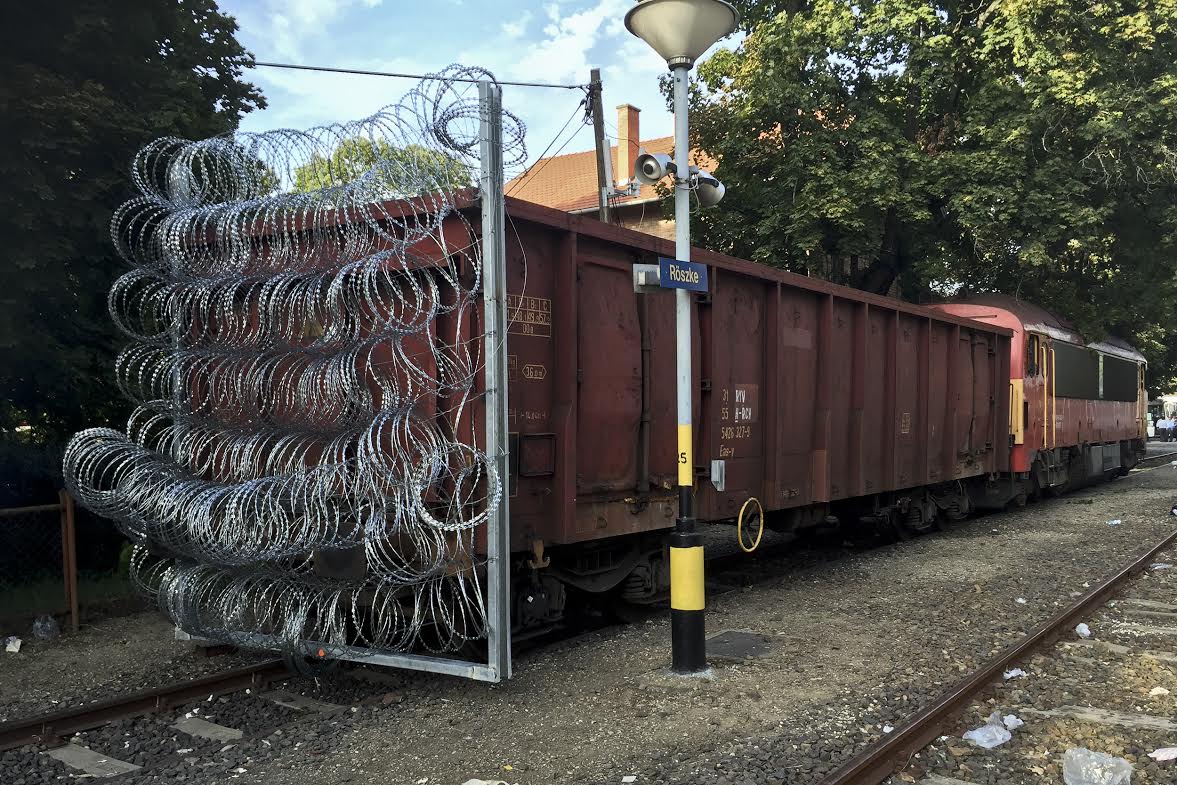
We're really out of words. Look at this fully-barbwired Mad Max-inspired monster train @#Roszke #Hungary #refugees: image via index,hu @indexhu, 14 September 2015
William Blake: The Human Abstract
Pity would be no more,
If we did not make somebody Poor:
And Mercy no more could be,
If all were as happy as we;
If we did not make somebody Poor:
And Mercy no more could be,
If all were as happy as we;
And mutual fear brings peace;
Till the selfish loves increase.
Then Cruelty knits a snare,
And spreads his baits with care.
Till the selfish loves increase.
Then Cruelty knits a snare,
And spreads his baits with care.
He sits down with holy fears,
And waters the ground with tears:
Then Humility takes its root
Underneath his foot.
And waters the ground with tears:
Then Humility takes its root
Underneath his foot.
Soon spreads the dismal shade
Of Mystery over his head;
And the Catterpiller and Fly,
Feed on the Mystery.
Of Mystery over his head;
And the Catterpiller and Fly,
Feed on the Mystery.
And it bears the fruit of Deceit,
Ruddy and sweet to eat;
And the Raven his nest has made
In its thickest shade.
Ruddy and sweet to eat;
And the Raven his nest has made
In its thickest shade.
The Gods of the earth and sea,
Sought thro' Nature to find this Tree
But their search was all in vain:
There grows one in the Human Brain.
Sought thro' Nature to find this Tree
But their search was all in vain:
There grows one in the Human Brain.
William Blake: The Human Abstract, from Songs of Experience, 1794
The last part of the iron fence on a train, at the Hungarian-Serbian border near Roszke..#AFP by @afpattila: image via Aurelia BAILLY @AureliaBAILLY, 14 September 2015
Border-free Europe unravels in migrant crisis: image via Reuters Top News @Reuters, 14 September 2015
Record numbers of migrants rush into Hungary before border sealed: image via Agence France-Presse @AFP, 13 September 2015
The makeshift camp at border by Roszke has noticeably grown over last week #refugeecrisis #hungary: image via Oliver Varney @ Oliver Varney, 12 September 2015 Röszke, Csongrad
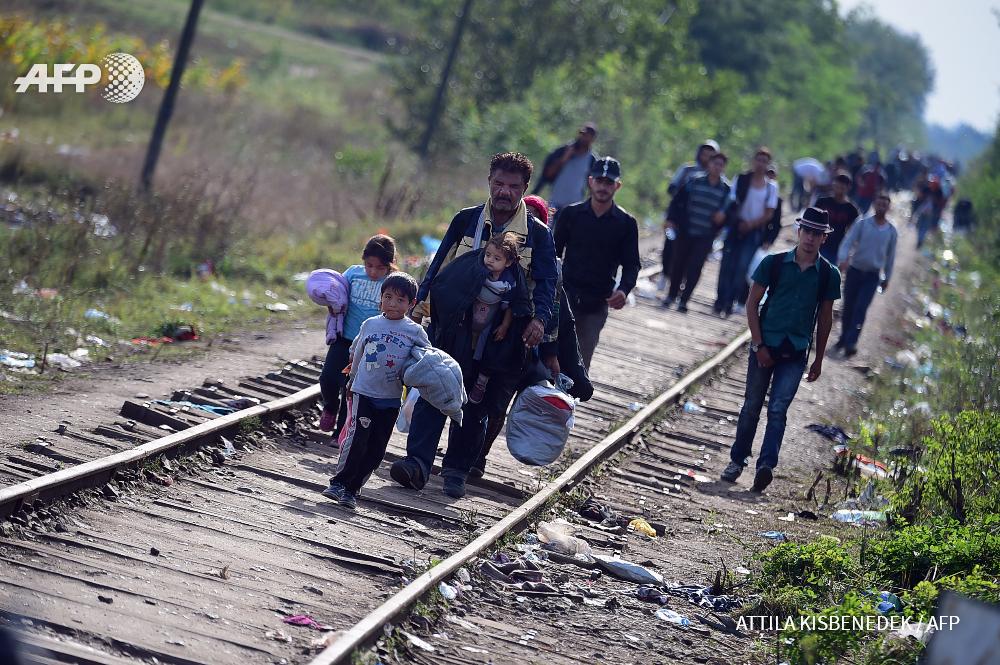
One of last groups of #migrants enters Hungary as police close off main crossing point entering from Serbia. By @afpattila: image via AFP Photo Department @AFPphoto, 14 September 2015
Record 5,809 migrants enter Hungary in new surge ahead of laws coming into force tomorrow jailing illegal immigrants: image via StephaneArnaud @Stéphane Arnaud, 14 September 2015

#Hungary rushes to complete anti-migrant barrier along its 175km border with Serbia: image via AFP Photo Department @AFPphoto, 14 September 2015
A #refugee trying to escape from police & soldiers in #Hungary after crossing the razor-wire & barbed wire fences. Scary.: image via Szaboics Panyi @panyiszaboics 12 September 2015
#migrants walk on rail tracks near the village of Roszke. #AFP PHOTO @afpattila: image via Aurelia BAILLY @AureliaBAILLY, 14 September 2015
#migrants walk along a railway track at the Hungary-Serbia border, near Horgos. #AFP Photo by @armend_nimani: image via Aurelia BAILLY @AureliaBAILLY, 14 September 2015

#migrants wait to board a train after crossing the Macedonian-Greek border near Gevgelija.#AFP by @RAtanasovski: image via Aurelia BAILLY @AureliaBAILLY, 14 September 2015

#migrants wait to board a train after crossing the Macedonian-Greek border near Gevgelija.#AFP by @RAtanasovski: image via Aurelia BAILLY @AureliaBAILLY, 14 September 2015

#migrants wait to board a train after crossing the Macedonian-Greek border near Gevgelija.#AFP by @RAtanasovski: image via Aurelia BAILLY @AureliaBAILLY, 14 September 2015

#migrants wait to board a train after crossing the Macedonian-Greek border near Gevgelija.#AFP by @RAtanasovski: image via Aurelia BAILLY @AureliaBAILLY, 14 September 2015

#migrants are diverted by police at the Hungary and Serbia border near Roszke. #AFP by @afpattila: image via Aurelia BAILLY @AureliaBAILLY, 14 September 2015

#migrants are diverted by police at the Hungary and Serbia border near Roszke. #AFP by @afpattila: image via Aurelia BAILLY @AureliaBAILLY, 14 September 2015

Border is closed in #Röszke now. Refugees we joined marching from Serbia to Hungary were stopped by police.: image via Fluchthilfe & Du @Fluchthilfeat, 14 September 2015

Austrian policemen confront refugees at closed border near Nickelsdorf: photo by Mariann Ory @otmarianna, 14 September 2015

Austrian policemen confront refugees at closed border near Nickelsdorf: photo by Mariann Ory @otmarianna, 14 September 2015
2km down is the official border crossing. Refugees are queuing but so far no one coming thru: image via Eric Randolph @EricWRandolph, 14 September 2015
Hungary border. Huge trains being loaded with migrants. Rumours they're going to Austria but police won't confirm: image via Eric Randolph @EricWRandolph, 14 September 2015

Border is closed in #Röszke now. Refugees we joined marching from Serbia to Hungary were stopped by police.: image via Fluchthilfe & Du @Fluchthilfeat, 14 September 2015

Border is closed in #Röszke now. Refugees we joined marching from Serbia to Hungary were stopped by police.: image via Fluchthilfe & Du @Fluchthilfeat, 14 September 2015

Border is closed in #Röszke now. Refugees we joined marching from Serbia to Hungary were stopped by police.: image via Fluchthilfe & Du @Fluchthilfeat, 14 September 2015

#Hungary rushes to complete anti-migrant barrier along its 175km border with Serbia: image via AFP Photo Department @AFPphoto, 14 September 2015

#Hungary rushes to complete anti-migrant barrier along its 175km border with Serbia: image via AFP Photo Department @AFPphoto, 14 September 2015

#Hungary rushes to complete anti-migrant barrier along its 175km border with Serbia: image via AFP Photo Department @AFPphoto, 14 September 2015
Welcome to the 21st Century! Anti-G8 demonstrations at Genoa, Italy, July 2001: photo courtesy of Azione Globale dei Popoli
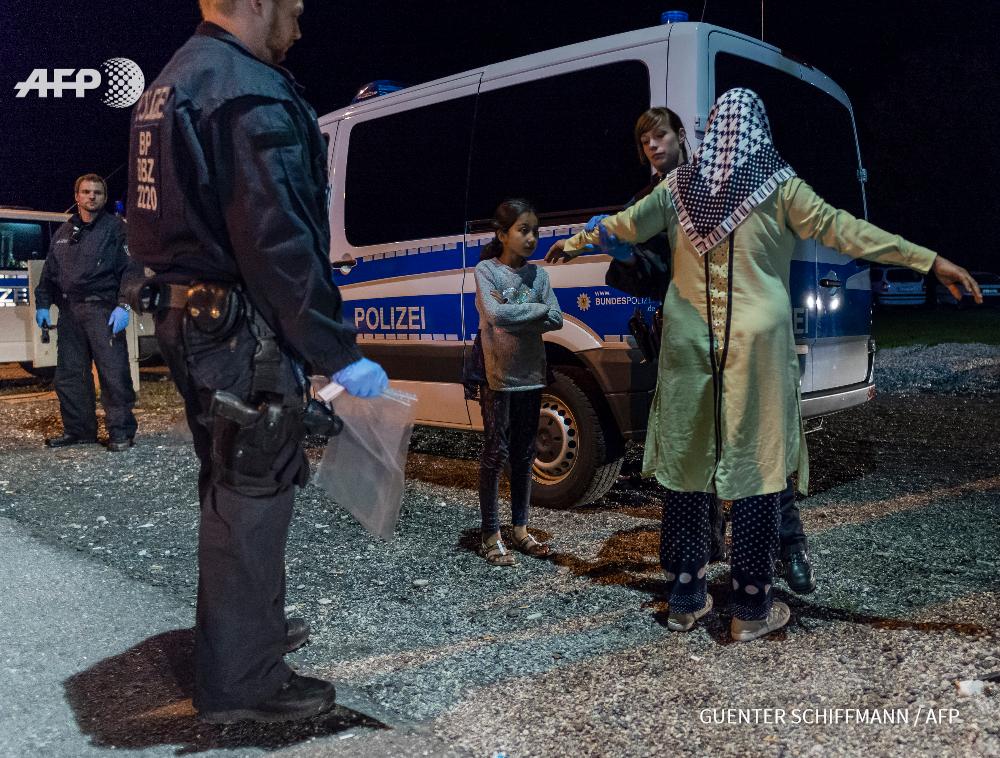
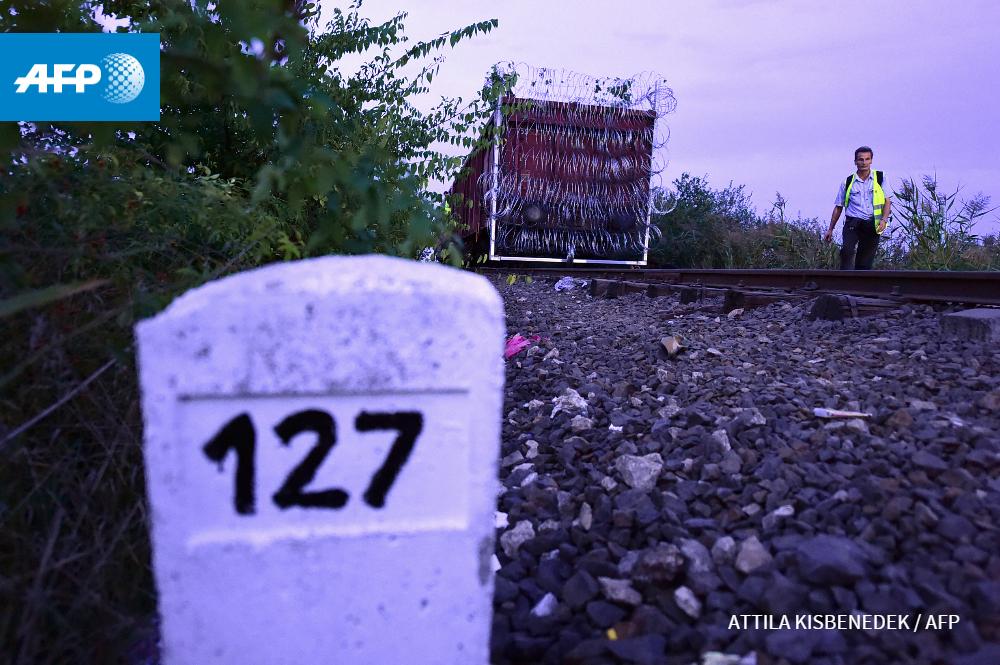
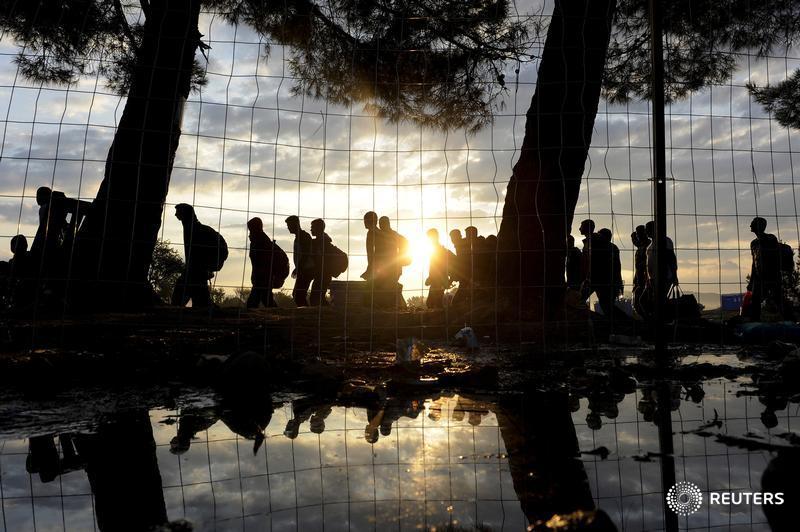
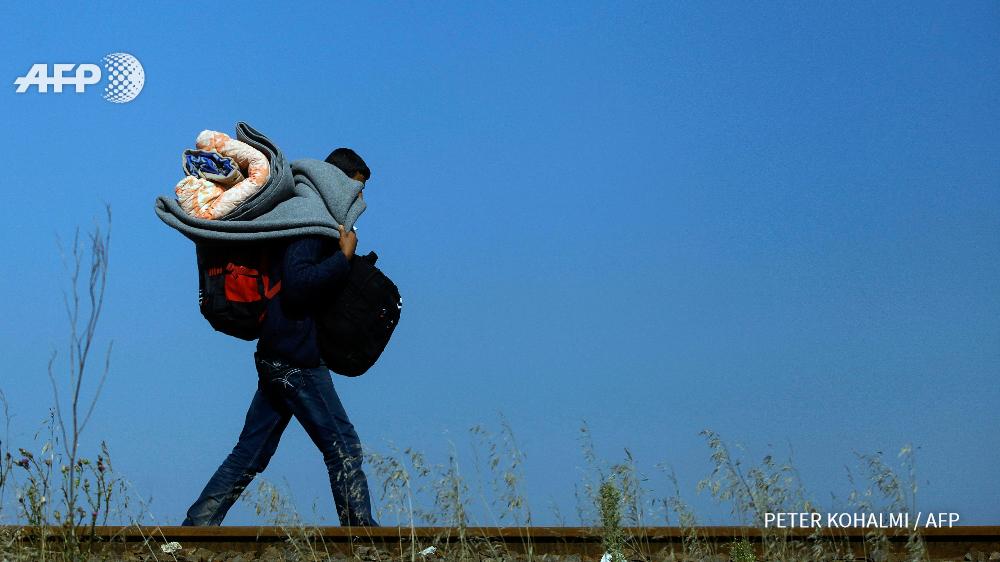
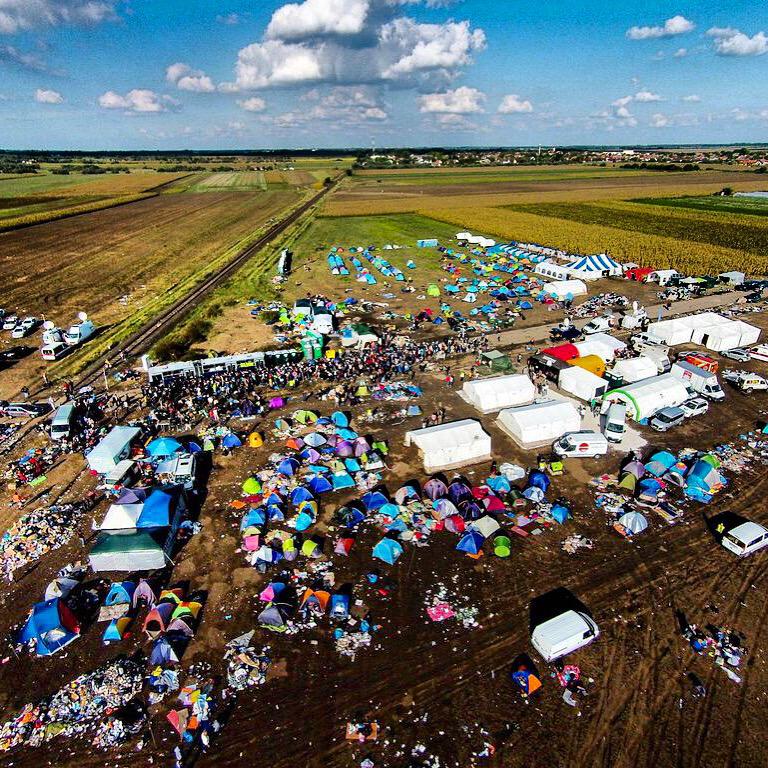

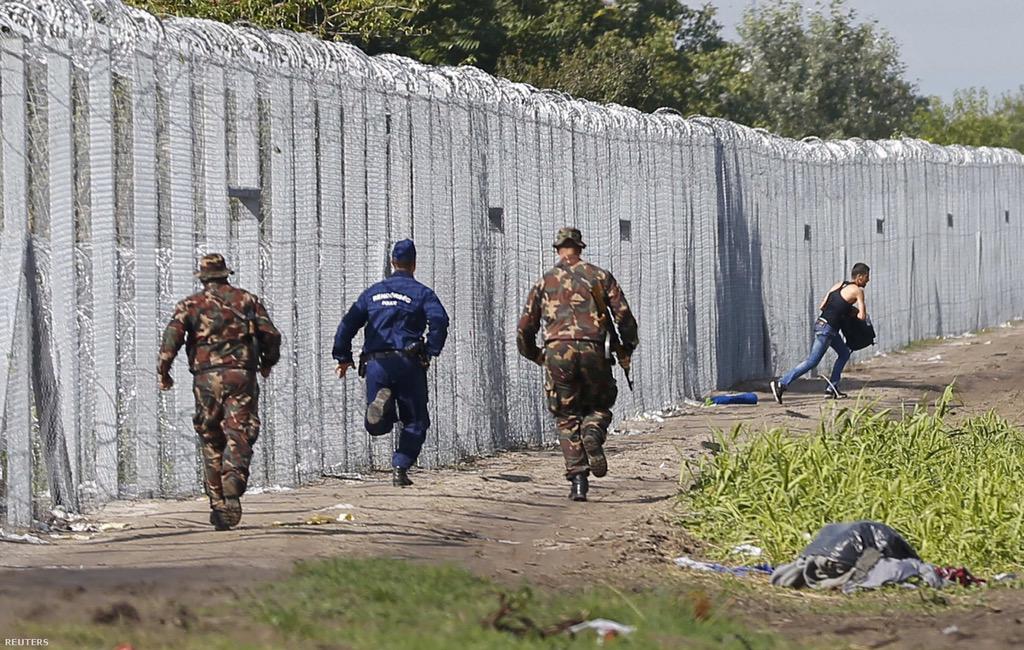
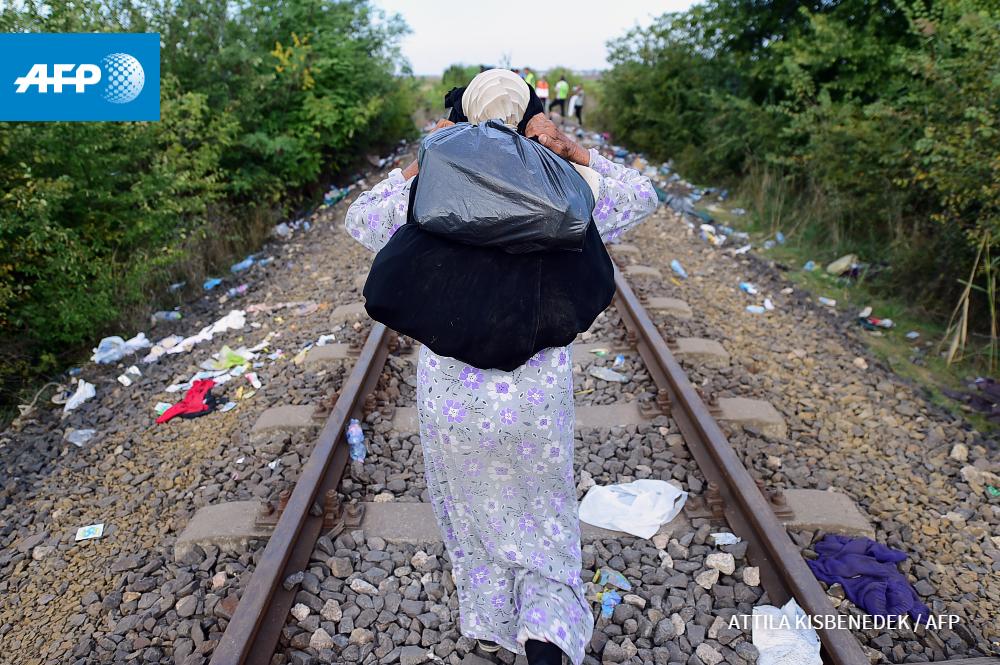

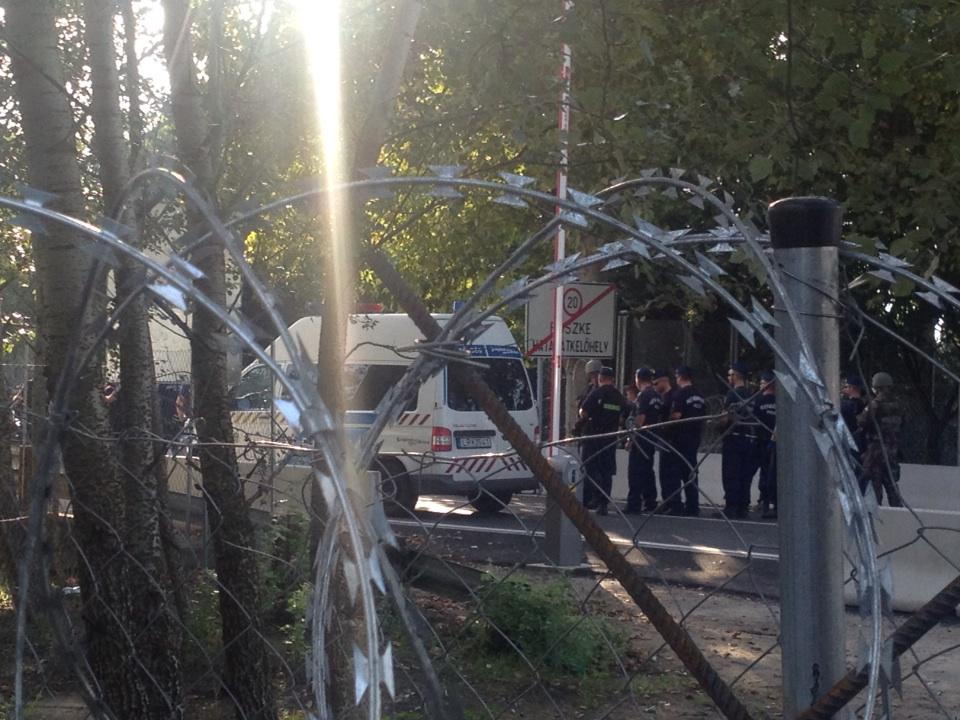




1 comment:
"and mutual fear brings peace"....like that!
Post a Comment